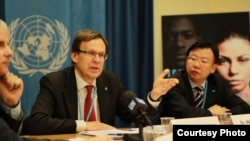In advance of World TB day (March 24), the World Health Organization is warning the battle to wipe out the global tuberculosis epidemic will not be won unless stigma, discrimination and marginalization of TB patients is brought to an end. VOA was in Geneva at the launch of new WHO ethics guidance for the treatment of people with tuberculosis.
Progress is being made toward achieving the U.N. Sustainable Development Goal of ending the global TB epidemic by 2030. The World Health Organization reports 49 million lives have been saved since 2000.
But, much remains to be done.
Data from 2015 show more than 10.4 million people fell ill and 1.8 million died of tuberculosis, with most cases and fatalities occurring in developing countries.
The World Health Organization says stigma and discrimination against TB patients hamper efforts to wipe out this deadly disease.
WHO Global TB Program medical officer Ernesto Jaramillo says vulnerable people, such as migrants, prisoners, ethnic minorities, marginalized women and children are most likely to suffer abuse, neglect and rejection.
He says this prevents them from seeking treatment for tuberculosis.
“Having new tools for diagnosis, and treatment of TB is not sufficient if there are not clear standards to ensure that vulnerable people can have access in a matter of priority to these tools in a way that the end TB strategy can really serve the interest not only of individuals, but also the interests of public health in general ," said Jaramillo.
WHO Global TB program director Mario Raviglione tells VOA no country, rich or poor, is immune from getting tuberculosis. He warns marginalizing patients with TB is dangerous.
“You cannot eliminate a disease like TB thinking that you build walls or you isolate your country," said Raviglione. "TB is an airborne disease. It travels by air. So, you have a Boeing 747 that leaves Malawi tonight and it comes to Switzerland tomorrow morning and there you go. So, it has to be faced from a global perspective.”
New WHO ethical guidance includes actions to overcome barriers of stigma, discrimination and marginalization of people with tuberculosis. The agency says protecting the human rights of all those affected will save many lives and will make it possible to end this global scourge.
